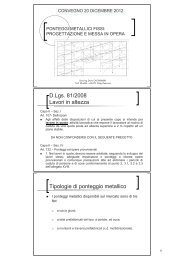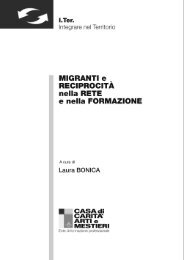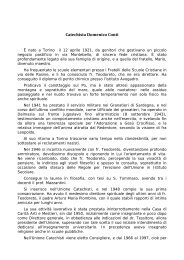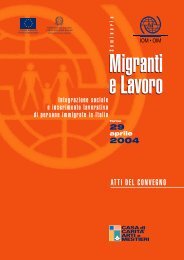Rapporto finale/ Final Report (ITA-ENG) - Casa di Carità Arti e Mestieri
Rapporto finale/ Final Report (ITA-ENG) - Casa di Carità Arti e Mestieri
Rapporto finale/ Final Report (ITA-ENG) - Casa di Carità Arti e Mestieri
You also want an ePaper? Increase the reach of your titles
YUMPU automatically turns print PDFs into web optimized ePapers that Google loves.
65<br />
Given the centrality and experimental nature of their role, we have attempted to summarise the<br />
relative strengths and weaknesses of this in view of the possibility of the experience being repeated<br />
in future, as already partially stated in Working Paper 2 (WP2).<br />
In the majority of cases, the establishment of the ASI coor<strong>di</strong>nator was a positive move because it<br />
guaranteed the presence of an official role de<strong>di</strong>cated to combating preju<strong>di</strong>ces and <strong>di</strong>scrimination.<br />
These issues which, as we have seen, arise on an everyday basis in schools, are usually addressed by<br />
the teachers and educators who work there, when they have time. The availability of an ad hoc project<br />
provided an opportunity to experiment the presence of a figure with time to implement specific activities<br />
in these fields: all partners judged this to be one definite strength of the project.<br />
In some contexts several ASI coor<strong>di</strong>nators were appointed within the same establishment and were<br />
thus able to share the work. The feedback on this aspect was that when more than one ASI coor<strong>di</strong>nator<br />
was present, the work was perceived as easier and more effective, since they could consult with<br />
one another as regards the activities, content and work with the Student Teams. Where there was<br />
just one ASI coor<strong>di</strong>nator (for instance, in Giaveno – Italy – and in the case of the Ferrante Aporti youth<br />
detention centre – again in Italy), the work was found to be more tiring.<br />
The experience in Spain was of particular interest: to implement a shared, transversal system and<br />
given the large number of pupils taking part, the Spanish partner chose to establish an ad hoc Cross<br />
Community Committee (CC) comprising the ASI coor<strong>di</strong>nators from the two centres (11 in all). This<br />
Committee held regular meetings, exchanged e-mails and kept a joint Log. It dealt with various aspects<br />
of project management and content. The presence of a working group addressing the same<br />
area resulted in a far richer set of proposals. It also made it possible to examine the activities together<br />
and adapt them as any shortcomings or new aspects emerged. This suggests that it would be good<br />
practice to establish de<strong>di</strong>cated working groups through which the ASI coor<strong>di</strong>nators can address the<br />
topic rather than acting separately.<br />
As far as relations between ASI coor<strong>di</strong>nators and the school are concerned, in many cases (especially<br />
with big schools) it was not always easy to involve teaching staff. Indeed, some ASI coor<strong>di</strong>nators<br />
pointed out the <strong>di</strong>fficulty of making the overall importance of their work and the aims of the project<br />
understood. This was frequently due to the lack of time for fostering relations, or for explaining<br />
each step of the project and the activities involved. In some cases it was because teachers failed to<br />
acknowledge the fact that <strong>di</strong>scrimination and intolerance were a problem within the structure (this<br />
occurred in France, for instance, where, as mentioned earlier, the institutions refuse to accept that<br />
intolerance is an issue in schools and other contexts, and teachers and head teachers hardly ever<br />
recognise that such problems exist or question their approach to the issue).<br />
Therefore, one weakness that needs to be addressed is how to share and address the problem. This<br />
aspect could be tackled by creating more collective forums, engaging all teachers and students, before<br />
implementing the longer-term and more specific activities with a smaller and more motivated<br />
group of people. In the Cross Community Schools project, when the experiment was presented to<br />
all (or the majority) of the students during an event at school, this generated greater interest in the<br />
activities and made teachers more inclined to acknowledge the usefulness of addressing the topic.







